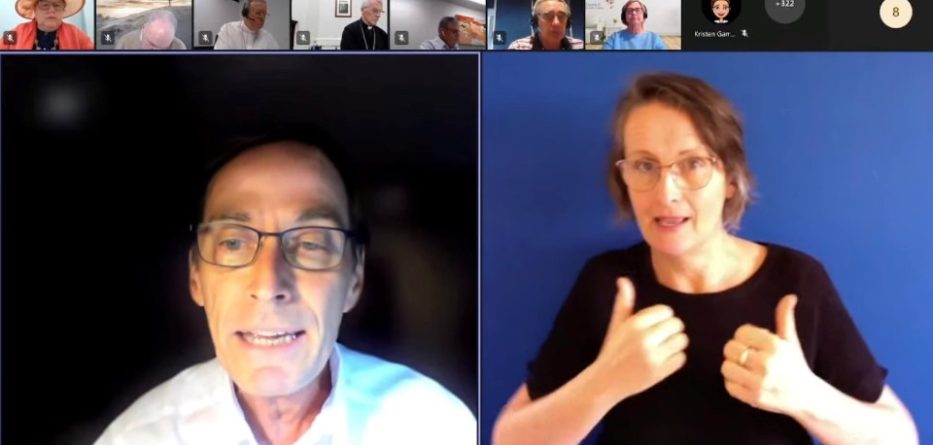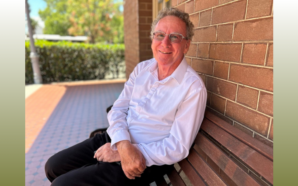Homily for the Closing Mass
The First Assembly of the Fifth Plenary Council of Australia
&
Feast of St John Henry Newman
Readings: Wisdom 7:7-11; Hebrews 4:12-13; Mark 10:17-30
10 October 2021
This weekend we mark the end of the first session of the Fifth Plenary Council of the Roman Catholic Church in Australia. We also celebrate the feast of the college’s patron, Cardinal John Henry Newman. We have not had much luck in celebrating his feast since his canonisation two years ago. Each day the feast day has come around, we have been in lockdown with the COVID pandemic precluding our being able to gather.
Listen at https://soundcloud.com/frank-brennan-6/newmans-feast-day-2021
The Church of England celebrates the commemoration of John Henry Newman, Priest, Tractarian, on 11 August; ie they commemorate his death which occurred on 11 August 1890. That would also be the more usual thing for us to do in the Roman Catholic Church. We usually celebrate the feast of a canonised saint on the date of their death, the day on which they enter eternal life – think just of Ignatius Loyola whose feast we celebrate on 31 July because he died on 31 July 1556. In one of our less ecumenical moves, our religious leaders decided to celebrate the feast of John Henry Newman on 9 October recalling the event at Littlemore outside Oxford on 9 October 1845 when the Passionist priest Fr Dominic Barberi visited Newman, hearing his confession and receiving him into full communion with the Roman Catholic Church. While apologising for all ecumenical insensitivity, we can still draw fruit from reflecting on the events of that day. Newman’s long, winding and rather tortured journey to that day is summed up in today’s first reading from the Book of Wisdom:
I prayed, and understanding was given me;
I entreated, and the spirit of Wisdom came to me.
I esteemed her more than sceptres and thrones;
compared with her, I held riches as nothing.
As an Anglican priest, Newman preached from the most prestigious pulpit in Oxford having become Vicar of the university church in 1828 – the Church of St Mary the Virgin in the High Street. He held a prized academic post at Oriel College. He also regularly visited the hamlet of Littlemore three miles outside Oxford attending to the pastoral needs of people having no connection with the university. His mother was instrumental in building the Littlemore Church which opened in 1835. The more he went back to his study of the early Church Fathers, the more attracted to Rome Newman found himself to be. During these years he withdrew more and more to the isolation of Littlemore. He moved to Littlemore on 9 February 1842 and preached his last Anglican sermon ‘The Parting of Friends’ on 25 September 1843. He resigned his Oriel fellowship on 3 October 1845.
On 9 October 1845, Newman made a general confession over two sessions. In between those sessions, Fr Barberi (who incidentally was simply making an overnight stopover on his way to Belgium) went into Oxford to say mass. During his confessional break, Newman, the inveterate correspondent, penned some letters to close friends confiding, ‘May I have only one tenth as part as much faith as I have intellectual conviction, where the truth lies!…I have been quite frightened lest I should not have faith and contrition enough to gain the benefit of the sacraments.’[1]
Newman’s conversion was no simple matter. There was no one blinding realisation or undoubted moment of grace. It was long painstaking work. This is the aspect of Newman’s life which has stayed with me this past week as we have witnessed the first session of the Plenary Council.
There’s been a lot said this week, especially about how we might ‘develop concrete proposals to create a more missionary, Christ-centred Church in Australia at this time’. During this first session, many issues have been aired and many perspectives offered, especially about the role of women in a patriarchal church, the place of belonging for rainbow people who are often excluded by teaching or practice, and the ongoing trauma caused by child sexual abuse which was usually committed by men and which was inadequately dealt with by men. Most fundamental has been the call for us to be eucharistic people able to gather and break open the Word so that it might be heard freshly by all who want to listen and break the bread so that it might incarnate the Body of Christ for all who hunger for the bread of life.
A couple of splendid lay-led and lay-controlled initiatives have opened the proceedings beyond the confines of those participating and beyond the channels of church owned social communications. The well known broadcaster Geraldine Doogue set up her own podcast and Facebook ‘Plenary Matters’. On one of those podcasts, Sister Clare Condon SGS, one of the periti (advisers) at the Council, spoke of the need for us all to have access to the learning of modern scripture scholars, helping us get back to the dynamism and reality of the Jesus story, much like Newman spent years plumbing the depths of the ancient Church Fathers. She spoke of the need to bring the meaning of the gospels ‘into our current world instead of us interpreting them individually in a way that we want to interpret them.’ She said: “That will bring us back to a much more authentic faith that is tied to Jesus of Nazareth, the Christ. …On Day One, a lot of people staked their claim. In our advisory group, one of the scripture scholars said, ‘Mm, 273 people there, and 273 versions of what a Christ-centred Church looks like.’”[2]
Clare suggested that it would be through the learning and insights of the scripture scholars that we would “find our place as a more humble church. And we’ll get back to basics.” She said, “I often ask myself, what is a more humble church going to look like, and it’s not there now.”[3] Another of the periti, Fr Richard Lennan, reminded us that the Amazon Synod taught us that ‘we need to unlearn those things which make our God too small; to learn where the Spirit is at work so that we might be expanded by God; and to relearn the wisdom of God at the heart of our Tradition.’ To unlearn, learn, and relearn.
Amidst the vast shopping list of hopes expressed by members, including those who hope for no change on topics which others strongly agitate, there has been a lot of reflection on the role of the Spirit. Lennan quoted to us the American theologian Elizabeth A. Johnson who says, ‘The Spirit represents ‘life, movement, colour, radiance and restorative stillness in the din’. Lennan reminded us: ‘Our task is to sniff out the presence of God in the world.’[4]
It’s one thing to open the discussion, it’s another for the Church authorities to allow the discernment to proceed. During the week, I kept thinking of Bishop Bill Morris who was forced to submit his resignation as the bishop of Toowoomba 10 years ago for daring to raise the very issues being most discussed this past week. His major offence was the publication of an Advent letter in which he said to the people: “Given our deeply held belief in the primacy of Eucharist for the identity, continuity and life of each parish community, we may well need to be much more open towards other options of ensuring that Eucharist may be celebrated.”[5]
He outlined various options including the ordination of women. Some of his critics suggested that he was initiating options contrary to the doctrine and discipline of the Church. At the time, he responded in the local media, “As a bishop I cannot and would not do that.”[6] When the American Archbishop Chaput came to investigate Morris, Chaput told the Vicar General of the Diocese that Morris “was a good, humane and prayerful bishop but innocent and naïve and open to manipulation because of (his) great desire to see good in everyone, and that people had taken advantage of (his) goodness and trust. (He) had been captured, manipulated and misled by a so-called progressive group of priests in the diocese who were in fact ‘running the diocese’; as a result of the actions of these priests, (he) had been led astray and now needed to recant, and in effect throw (himself) on the mercy of the Vatican authorities, promising a more orthodox and obedient future.”[7]
I take heart from this past week that we have come a long way in the Australian Church in the decade since the effective sacking of Bishop Morris. And with all respect, I say that our bishops have been on that journey too. If Bishop Morris were a member of this plenary council, he would be the sort of pastoral leader of his people who would be carrying the faith, intellectual conviction and contrition needed for us to move towards becoming a transparent, inclusive and humble church at the second session in July next year.
Despite our ecumenical insensitivity in the choice of the feast day for Newman, we Catholics still happily quote many of his finest homilies which were delivered in his Anglican years. Here at Newman College, we are fond of quoting the closing lines of his homily on wisdom and innocence delivered on 19 February 1843 a year after he had moved to Littlemore and seven months before he preached his last Anglican sermon:
“Let us beg of our Divine Lord to take to Him His great power, and manifest Himself more and more, and reign both in our hearts and in the world. Let us beg of Him to stand by us in trouble, and guide us on our dangerous way. May He, as of old, choose “the foolish things of the world to confound the wise, and the weak things of the world to confound the things which are mighty!” May He support us all the day long, till the shades lengthen, and the evening comes, and the busy world is hushed, and the fever of life is over, and our work is done! Then in His mercy may He give us safe lodging, and a holy rest, and peace at the last!”[8]
Happy Feast Day, and may we display the same humility and persistence as did Newman all those months at Littlemore as we discern this next phase of our Plenary journey of the Church in Australia determining how to “create a more missionary, Christ-centred Church at this time”. I do hope Bishop Morris is invited to the next session, and I do hope we will be able to celebrate the patronal feast of our college out of lockdown in the year to come.
[1] J H Newman, Letter to T W Allies, 9 October 1845, in The Letters and Diaries of John Henry Newman, Volume XI, Thomas Nelson and Sons, 1961, p. 12
[2] Listen at https://podcasts.apple.com/au/podcast/plenary-matters-ep-8-looking-to-the-future/id1587458085?i=1000537947134. Another splendid lay initiative is Concerned Catholics Canberra-Goulburn, Plenary Tracker at https://concernedcatholicscanberra.org/new-page-52 with the theme: ‘Toward a Transparent, Inclusive and Humble Church’.
[3] Looking to the Future, https://plenary-matters.zencast.website/episodes/plenary-matters-ep-8-looking-to-the-future
[4] See https://www.youtube.com/watch?v=SBOIPnTFyjw
[5] William Morris, Advent Pastoral Letter 2006, available at William Morris, Benedict, Me and the Cardinals Three, ATF Press, 2014, p. 324
[6] Ibid, p. 354
[7] Ibid, p. 91
[8] J H Newman, ‘Wisdom and Innocence’, Sermons on Subjects of the Day, no.20 (London: Rivington, 1995), p. 207
Fr Frank Brennan SJ is the Rector of Newman College, Melbourne, and the former CEO of Catholic Social Services Australia (CSSA). He has been appointed a peritus at the Fifth Plenary Council of the Australian Catholic Church.








